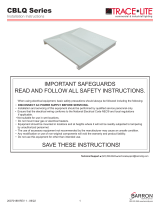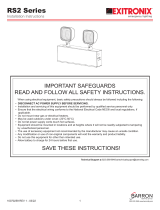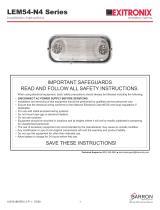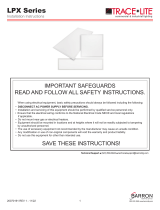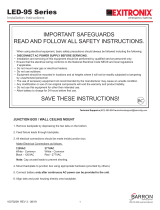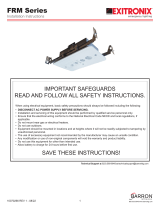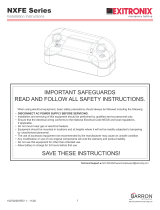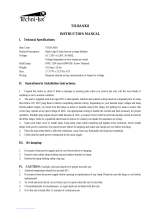Page is loading ...

IMPORTANT SAFEGUARDS
READ AND FOLLOW ALL SAFETY INSTRUCTIONS.
When using electrical equipment, basic safety precautions should always be followed including the following:
• DISCONNECT AC POWER SUPPLY BEFORE SERVICING.
• Installation and servicing of this equipment should be performed by qualified service personnel only.
• Ensure that the electrical wiring conforms to the National Electrical Code NEC® and local regulations
if applicable.
• Do not mount near gas or electrical heaters.
• Do not use outdoors.
• Equipment should be mounted in locations and at heights where it will not be readily subjected to tampering
by unauthorized personnel.
• The use of accessory equipment not recommended by the manufacturer may cause an unsafe condition.
• Any modification or use of non-original components will void the warranty and product liability.
• Do not use this equipment for other than intended use.
• Allow battery to charge for 24 hours before first use.
• For use with metal enclosed wiring systems.
SAVE THESE INSTRUCTIONS!
Technical Support ■ (623) 580-8943 ■ [email protected]
XEB2-14-LM Series
Installation Instructions
10070242 REV 1 - 02/21 800-533-3948 www.barronltg.com
1

Notes
1. Prior to installation, battery connector must be open to prevent high voltage from being present on output leads (red &
yellow). It must be connected only after installation is complete and AC power is supplied to the unit.
2. This unit can operate commonly used linear and compact fluorescent lamps. Please refer to the “lamps list” label on the
ballast for specific lamp information.
3. Please ensure the electricity connections conform to the National Electrical Code and local regulations if applicable.
4. To avoid electric shock, please disconnect normal and emergency power supplies, and battery connector of the
emergency ballast before servicing.
5. This device is designed for factory or field installation in either the ballast channel, or on top of the fixture, except air
handling heated air outlets, sealed and gasketed fixtures, wet or hazardous location fixtures. Do not install this device
near gas or electric heaters.
6. AC power source of 120VAC or 277VAC is required.
7. The battery is sealed, no-maintenance, and is not replaceable in the field. Please contact manufacturer for information
on service. Do not attempt to service the battery.
8. Do not use accessory equipment that is not recommended by manufacturer. Failure to do so may cause unsafe
conditions. Servicing should only be performed by qualified service personnel.
9. Do not use the product for other than its intended purpose.
CAUTION: Verify that all replacement lamp types marked on the installed luminaire are also identified as suitable for use
with this inverter/charger pack.
Mounting the Emergency Ballast (Battery Pack)
Remove the ballast channel cover. Mount the EMERGENCY BALLAST in the ballast channel at least 1/2” away from the
AC ballast(s).
When battery packs are remote mounted, the remote distance cannot exceed 1/2 of the distance from ballast to lamp
specified by the AC ballast manufacturer. For example, if the AC ballast manufacturer recommends no more than 25'
remote distance, then the battery pack's remote mounting distance should not exceed 12 1/2'. Under no circumstances
should the battery pack exceed a distance of 50' from the lamp(s).
Wiring
Refer to the wiring diagrams on the back page for the appropriate wiring of lamp(s) and ballast. Install in accordance with
the National Electrical Code and local regulations. For additional wiring diagrams consult Customer Service.
XEB2-14-LM Series
Installation Instructions
10070242 REV 1 - 02/21 800-533-3948 www.barronltg.com
2

Installing the LED Combo Test Switch (LCTS)
Recessed Troffer Fixture (Fig. 1)
Select a convenient location with proper clearance in the
ballast cover and drill or punch a 7/8" hole (1/2" knockout).
Insert the 7/8" bushing into the hole. Push the plastic tube
through the bushing. Route the leads of the LCTS through
the plastic tube. Connect the wires from the unit to the
LCTS (VIOLET to VIOLET, BROWN to BROWN). Push the
entire assembly back into the tube until the lens collar rests
against the plastic tube. The plastic tube should be adjusted
so that the LCTS is within 1/4" of the fixture lens. The LCTS
must be visible after installation.
Strip Fixture (Fig. 2)
Select a convenient location on the fixture so the LCTS can
be seen after installation. Allow for proper clearance inside
the fixture and drill or punch a 1/2" hole. Remove the nut
from the LCTS. Push the LCTS housing into the 1/2" hole
and secure with the nut. Connect the wires from the LCTS
(VIOLET to VIOLET, BROWN to BROWN).
Wiring the AC Input
The EMERGENCY BALLAST and AC ballast must be on the same branch circuit.
The EMERGENCY BALLAST requires an unswitched AC power source of either 120 or 277VAC. Select proper voltage
lead and cap the unused lead.
When the EMERGENCY BALLAST is used with a switched fixture, the AC input to the EMERGENCY BALLAST must be
connected ahead of the fixture switch. Refer to Fig. 3 for switched and Fig. 4 for unswitched fixture wiring diagrams.
Fig. 1 - Recessed Troffer Fixture
Fig. 2 - Strip Fixture
Fig. 3 - Switched Fixture Fig. 4 - Unswitched Fixture
XEB2-14-LM Series
Installation Instructions
10070242 REV 1 - 02/21 800-533-3948 www.barronltg.com
3

Labels
Attach the appropriate labels adjacent to the LCTS. Annotate ‘Re-lamping’ label for lamp type and wattage. The 'Caution'
and the 'Re-lamping' labels must be on the fixture in a readily visible location to anyone attempting to service the fixture.
Completing Installation
When the installation is complete, switch the AC power ON and join the EMERGENCY BALLAST'S unit connector.
Operation
Normal Mode
AC power is present. The AC ballast operates the fluorescent lamp(s) as intended. The LCTS will be lit providing a visual
indication that the EMERGENCY BALLAST is in the standby charging mode.
Emergency Mode
AC power fails. The EMERGENCY BALLAST senses the AC power failure and automatically switches to the Emergency
Mode. One or two lamps illuminate at reduced output, for a minimum of 90 minutes. When AC power is restored, the
EMERGENCY BALLAST switches the system back to the Normal Mode and resumes battery charging.
Testing & Maintenance
Pressing the red lens on the LCTS turns off the light on it, interrupts power to the designated AC ballast and forces the
unit into emergency mode. The emergency lamp(s) is (are) now lit by the EMERGENCY BALLAST. On releasing the lens,
fixture returns to normal mode after a momentary delay. To simulate a “BLACK OUT” use the circuit breaker to turn off the
AC power.
Initial Testing
Allow the unit to charge for approximately 1 hour, then press the LCTS to conduct a short discharge test. Allow a 24 hour
charge before conducting a 1 1/2 hour test.
This EMERGENCY BALLAST is a maintenance free unit; however, periodic inspection and testing is required. NFPA 101,
Life Safety Code, outlines the following schedule:
Monthly
Ensure that the LCTS is illuminated. Conduct a 30 second discharge test by depressing the LCTS. One lamp should
operate at reduced output.
Annually
Ensure that the LCTS is illuminated. Conduct a full 1 1/2 hour discharge test. The unit should operate as intended for the
duration of the test.
XEB2-14-LM Series
Installation Instructions
10070242 REV 1 - 02/21 800-533-3948 www.barronltg.com
4

Wire Diagrams for Lamp Emergency Operation
Note: Emergency ballast and AC ballast must be fed from the same branch circuit
Typical schematics only. May be used with other ballasts. Consult the factory for other wiring diagrams.
Use the proper tap to cap unswitched AC lead.
For One Lamp Emergency Operation (Fig. 5 - 12)
Fig. 5 - One (1) Lamp Instant Start AC Ballast Fig. 6 - Two (2) Lamp Instant Start AC Ballast
Fig. 7 - Three (3) Lamp Instant Start AC Ballast Fig. 8 - Four (4) Lamp Instant Start AC Ballast
Fig. 9 - One (1) Lamp Rapid Start AC Ballast Fig. 10 - Two (2) Lamp Rapid Start AC Ballast
XEB2-14-LM Series
Installation Instructions
10070242 REV 1 - 02/21 800-533-3948 www.barronltg.com
5

Fig. 11 - Three (3) Lamp Rapid Start AC Ballast Fig. 12 - Four (4) Lamp Rapid Start AC Ballast
Wire Diagrams for Lamp Emergency Operation (Continued)
For Two Lamps Emergency Operation (Fig. 13 - 16)
Fig. 13 - Two (2) Lamp Instant Start AC Ballast Fig. 14 - Three (3) Lamp Instant Start AC Ballast
Fig. 15 - Four (4) Lamp Instant Start AC Ballast Fig. 16 - Two (2) Lamp Rapid Start AC Ballast
XEB2-14-LM Series
Installation Instructions
10070242 REV 1 - 02/21 800-533-3948 www.barronltg.com
6

Fig. 17 - One (1) Lamp Without AC Ballast Fig. 18 - Two (2) Lamp Without AC Ballast
Wire Diagrams for Lamp Emergency Operation (Continued)
Emergency Only Operation (Fig. 17 & 18)
XEB2-14-LM Series
Installation Instructions
10070242 REV 1 - 02/21 800-533-3948 www.barronltg.com
7

Table 1 (For Brown Connector)
XEB2-14-LM Series
Installation Instructions
10070242 REV 1 - 02/21 800-533-3948 www.barronltg.com
8
/


